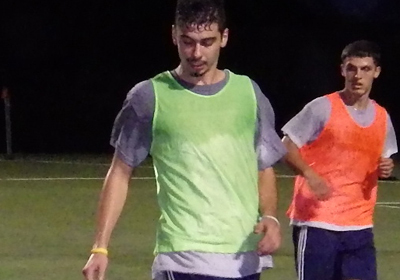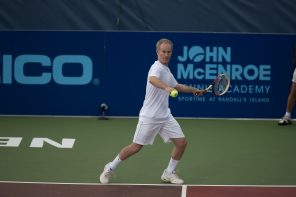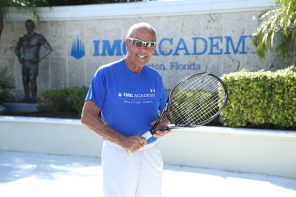The locker rooms at Alan R. Skidelsky Memorial Field in New Rochelle are what you might call a work in progress – which is to say right now there are no locker rooms.
Members of The Westchester Flames, the soccer team that plays its home games at Skidelsky, can’t take showers on match days and have to change into their playing gear in their cars or on the sidelines before matches. The Flames, ever the courteous hosts, send visiting teams to nearby Monroe College to use its locker rooms.
On the Sunday following Independence Day, the GPS Portland Phoenix, from Maine, were scheduled to arrive by the 7:30 p.m. start. But the clock on the pre-digital scoreboard clicked down to kickoff, 0:00 came and went and still no Phoenix. About 30 spectators in the five rows of bleachers waited during the extended warm-ups.
When the opposing team showed up shortly before 8 p.m., Flames supporters admitted to being impressed by Portland’s jerseys: Unlike Westchester, Portland has players’ last names on the back of the shirts. One person refused to be impressed, though, when he noticed that one of the Phoenix players was borrowing a teammate’s jersey and therefore two people with the same name and number were warming up for Portland.
Gus Skoufis, the Flames’ head coach, is a short man with graying hair, a mustache and hints of the Greek accent he brought to the U.S. when he moved here at age 12. He sports leather loafers and a nice watch, wearing a Polo shirt tucked into pleated pants. He watches warm-ups from a distance, and when he speaks to players he gets close to them. He never seems to face them directly, but stands alongside them and pivots in their direction. He speaks with his hands. When he is calm, it’s with the fluid, rhythmic motions of splayed fingers, like a conductor. When he is being critical, it is with closed fists banging on an invisible table and karate chops through nonexistent two-by-fours.
“If they want to make it to the pros,” he says of his players, “here they show it to me. The No. 1 attribute to a quality player is character, then come skills, commitment and toughness. Everyone can call themselves an athlete, but only a few can go on from here.”
Jerry Fischoff, the public address announcer and scoreboard operator, got things going in the cramped press box, with its faded lavender paint and fluorescent lights. It has no air conditioning and only three metal folding chairs for Fischoff and members of the local television station who were filming with one camera. The P.A. system consists of one 200-watt speaker blaring out of an open window in the press box. Fischoff was the DJ, switching between a few Sharpie-marked CDs in an Insignia brand portable CD player. Think a circle-shaped version of a Sony Discman. He was also the announcer, introducing players on a hand-held microphone, pulling back his New York accent while reading off crinkled papers through bifocals on the end of his nose. And he was also the official stat keeper for the game.
It was the Flames’ last home game of the season and third to last game overall. The season hadn’t gone well, with Westchester having won only two games and tied two others the entire season, losing seven on their way to finishing second to last in their division. Portland wasn’t exactly a powerhouse of the division, having won only three with no ties. The Flames knew they had a chance to win their last home game, and, smelling blood in the water, they took the lead in the 26th minute on a goal from midfielder Ryan Williams.
The Westchester Flames play in the Northeastern division of the USL Premier Development League, which is the fourth-tier professional league in the country. The rules of the game are similar to international rules, with the exception being that the development league teams are allowed six player substitutions rather than three.
Westchester’s players are a mixture of college soccer players keeping up their conditioning during the off-season and a few postgrads still holding out hope they’ll catch the eye of a scout and play on a higher level. The team also hosts youth camps and fields an under-20 squad.
Josh Maley, a midfielder from Poughkeepsie, graduated college two years ago and played for two seasons in Holland on a team called ADO Den Haag. He now works full-time for Merrill Lynch but is able to make practices on Tuesdays and Thursdays because they are after office hours. He’s not willing to give up on soccer just yet.
“It’s tough,” he says. “It just kind of sticks with you.” He’s hoping to catch on with a U.S. Major League Soccer club.
Rilwan Salawu was born in Nigeria and now lives in Brooklyn. He played for SUNY Binghamton and went on to play for Maxbees FC, a third division team in Ghana and Kartalspor in the Turkish league. He hopes to return to play in Turkey and has been playing in Westchester to recover from a leg injury.
“I seize every opportunity,” says Salawu, who is 26 and has the confidence of a young Magic Johnson. “I just need to get the right eyes on me.”
The Flames were formed in 1999 and won the championship in 2001, the same year they began playing at Skidelsky Field. Over the years, the team has seen several alumni go on to play at higher levels, including Charlie Davies. A member of the U.S. National Team, Davies didn’t see time during the 2010 World Cup when he was injured in a car accident. He now plays for the New England Revolution in MLS.
Coach Skoufis says getting the best players to the pros is always the goal. “That’s our job,” he says. “(Soccer) is their life, believe it or not.”
In recent years, as Skidelsky Field is in the process of renovation, the team has seen major changes to its roster. It hasn’t made the playoffs since 2006.
Portland stormed back in the second half, with Westchester goalkeeper Thomas Spenser facing a firing squad of attacks. The Phoenix tied the game in the 64th minute and jumped ahead, 2-1, in the 88th minute.
Spenser, who plays for the University of Rhode Island, was a bit downtrodden coming off of the field but positive about the game experience. He is 21 years old.
In the end, he says, he knows dedication is what separates a college athlete from someone who elevates his game to the professional level. “It comes down to how hard you work,” he says. “You can’t go on raw talent all the time.”
One by one, the Flames’ players made their way off the field to their cars. The head coach, head down, walked slowly across midfield toward the exit. Next year, he says, he hoped work on the facilities would be completed. As for the roster, a development league team is always a work in progress. With more professional facilities, he says he was aiming for more professional-level players.
“Hopefully, next year will be the year we go back up where we belong.”
For more information, visit uslsoccer.com




